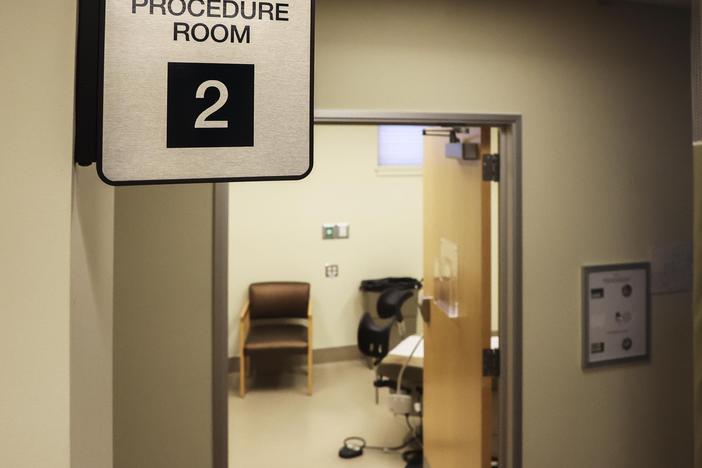Section Branding
Header Content
The Capitol fox fascinated folks. But no one mentioned the cost of rabies treatment
Primary Content
Ximena Bustillo was leaving the U.S. Capitol grounds on Tuesday when she felt a tiny stab and scratch on her left ankle. Bustillo, who is a food and agriculture policy reporter for Politico, immediately let out a shrieking scream as she whipped around and found herself face-to-face with a red fox.
The two were in a standoff for a few moments, Bustillo said, as she continued screaming and swinging her backpack at the animal to get it to go away. Some congressional staffers nearby heard her and came to help.
Finally, the fox relented and ran into the bushes, but it left Bustillo standing there with a bleeding ankle. Almost immediately, the panic set in. What should she do? Whom should she call? Also, can foxes carry rabies?
The answer is, yes, foxes can carry rabies, the viral disease that is transmitted most often through the saliva in an animal bite. Rabies has one of the highest mortality rates, yet deaths in the U.S. are extremely rare because of the effectiveness of post-exposure treatment.
Foxes are one of the most common animals in the U.S. to host the rabies virus, along with bats, raccoons and skunks, according to the Centers for Disease Control and Prevention. After the Capitol Hill fox was captured and euthanized so testing could be done, DC Health, the District of Columbia's health agency, confirmed that the fox tested positive for the rabies virus.
Even before that confirmation, though, Bustillo had already started the post-exposure prophylaxis treatment for rabies that many people bitten by wild animals undergo. What remains to be seen is how much this encounter will cost her. Nearly 55,000 Americans get the post-exposure prophylaxis treatment each year, the CDC says, but the cost varies greatly.
The treatment usually involves a series of five shots: one dose of rabies immunoglobulin and four shots of the rabies vaccine given over two weeks. This can vary depending on how bad a bite or exposure is and whether a person is immunocompromised. The good news is that the treatment is extremely effective and the death rate from rabies in the U.S. is extremely low. In 2021, the country recorded five rabies deaths, which was the highest number in a decade, but no deaths or cases were reported for the entirety of 2019 and 2020.
Although a few different brand options exist, the cost of this treatment ranges from $4,868.35 to $5,930.83, according to the latest drug-pricing data from GoodRx, a website that promotes drug-pricing transparency and helps people get discounts on prescription drugs.
However, GoodRx's estimate doesn't include the cost of administering these drugs, which are typically given in a hospital. That means prices are also subject to a markup. Studies over the years have found that hospitals can easily bill patients for twice the cost of a drug — or sometimes 10 times the cost.
Medical treatments aren't billed as the patient leaves the hospital, and Bustillo isn't done with her full course of shots yet, but she is already thinking about the cost.
"I have been hearing from everybody that it's extremely expensive," Bustillo said. "I've gotten different number amounts. I've seen $900 a shot. I've seen $1,800 a shot. I've seen $8,000 a shot. ... But I mean, I honestly have no idea. I know I paid a copay out of pocket yesterday that was $60, and that's always an expenditure that you don't plan on."
Erin Fox is a senior pharmacy director at University of Utah Health. One of the things her team does is track drug shortages and drug pricing.
When it comes to the rabies vaccine, Fox says there are two suppliers in the U.S. and three suppliers of the immunoglobulin. Although that may sound like a small number, Fox said that's pretty much on par for similar drugs in the United States.
But the high price tag of the drugs comes down in part to how many people need them.
"If you think about it, even though a large number of people do get bitten each year, it is still a fairly low-use product," Fox said. "So it's not like a vaccine that's on a schedule where everyone has to get one, you know, every X number of years."
The rabies vaccine isn't required for children to go to school, and it's not one that every person needs. This leads to a smaller market, and so, Fox said, it almost makes sense that the companies are trying to charge enough to still be able to make the product.
Still, the cost of the lifesaving treatment can saddle uninsured people with debt. Rep. Ami Bera, D-Calif., was bitten by the fox on Monday night. Bera, who had a 20-year career in medicine prior to serving in Congress, said people bitten by wild animals should not have to bear the cost out of pocket.
"Price shouldn't be the object here," Bera said. "This is a public health issue where someone who doesn't have the means but who gets bitten, we ought to make the immunoglobulin and rabies vaccine — like this is a matter of life and death — so my perspective as a doctor is that shouldn't be a barrier."
Copyright 2022 NPR. To see more, visit https://www.npr.org.
Correction
A previous version of this story had the incorrect number of vaccine and immunoglobulin manufacturers. There are two vaccine manufacturers and three immunoglobulin manufacturers.
Bottom Content






